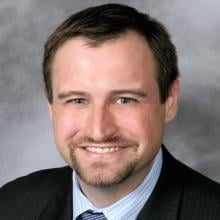Contents
Each month, the AMA highlights institutions that are part of the AMA Accelerating Change in Medical Education Consortium to showcase their work with the consortium and innovations in medical education.
Featured institution and leadership
Isaac Kirstein, DO
Dean
Ohio University Heritage College of Osteopathic Medicine
Number of years in the consortium: 6 years
What are your Accelerating Change in Medical Education project and goals?
The Transformative Care Continuum (TCC) is a joint project between Ohio University Heritage College of Osteopathic Medicine and Cleveland Clinic. The over-arching goal is to create a primary care physician workforce equipped to lead teams that will change how health systems deliver care and ultimately improve the health of the communities we serve. In addition to the core competencies and expected milestones of all our graduates, the TCC leaders will have a comprehensive skillset that includes change management, Quality/Process Improvement, informatics, community partner integration and more.
The program is an accelerated family medicine training program, pairing a three-year DO degree with a three-year family medicine residency to form a continuous six-year curriculum. Thanks to the support from the American Medical Association, our participation in the consortium has allowed us to learn from a dynamic group of innovators in Health Systems Science Training and competency-based education as we train across the entire continuum. Additionally, by creating a fully UME to GME linked cohort from the start, we can contribute a valuable perspective as the consortium evolves with our new GME members.
What are some recent accomplishments related to your Accelerating Change in Medical Education work that would be of interest to others in the medical community?
Now that the HSS components have been implemented, our team has now turned attention to evolving the competency-based tools across the continuum. Using a novel micro-evaluation methodology, the program has demonstrated that the first graduates met competencies in the seven domains as measured by their Micro Evaluation tools. This data set has been validated by comparison to traditional track residents in the same programs. Another area of innovation has been the study of Entrustable Practice Activities across the UME/GME continuum. Our joint faculty have mapped twenty family medicine EPA’s to be used to personalize learning plans as the cohort transitions to residency. Studies continue to incremental improvements for subsequent cohorts.
How does your work contribute to advancing equity, diversity and belonging in medical education?
Two intentional components of the program design are cohort selection and educational location. We matriculate learners committed to Family Medicine from day one, we also recruit a very diverse cohort. There is learner representation from under-represented in Medicine, first generation, and LGBTQ+ backgrounds. The clinical and community learning environments are in zip codes where poverty, the continued impacts of red-lining, and LGBTQ+ issues impact health every day. Immersed in this environment, the learners design and implement their own community health projects that address the issues of healthcare disparities resulting from poverty, structural racism, and bias. Our challenge is to provide enough support for the learners as they tackle these issues as part of the program, while they may be impacted by them directly at the same time.
What do you think will change about medical education in the next five years?
The incorporation of Competency Based Education (CBE) practices will accelerate. The evolution of assessment methods, licensing exams going pass/fail, the new concepts of GME-readiness, and personalized learning plans are all pulling the flywheel of time-independent medical education in the same direction. In addition, there will be increasing amounts of Health System Sciences (HSS) curriculum throughout the continuum. Underlying these changes will be the continued economic, social, and climate issues effecting the care of our nation. Medical Education will be challenged to provide more value to the system as measured by better patient (as opposed to educational) outcomes at a lower total cost. CBE and HSS, if implemented effectively, may help us meet that challenge.
Can you share some strategies to maintain team management and well-being in health care?
After years of high-stress emergent management of our health care teams, we need to re-focus our attention on the soft skills of leadership. We need to re-connect with old wells of intrinsic motivation (our calling) and find new sources that keeps the teams engaged. Everyone must feel like they belong, they matter, and they make a difference. There are no shortcuts. We must do the hard work of building relationships every day. Prioritize people and purpose over process.
Table of Contents
- Featured institution and leadership
- What are your Accelerating Change in Medical Education project and goals?
- What are some recent accomplishments related to your Accelerating Change in Medical Education work that would be of interest to others in the medical community?
- How does your work contribute to advancing equity, diversity and belonging in medical education?
- What do you think will change about medical education in the next five years?
- Can you share some strategies to maintain team management and well-being in health care?




